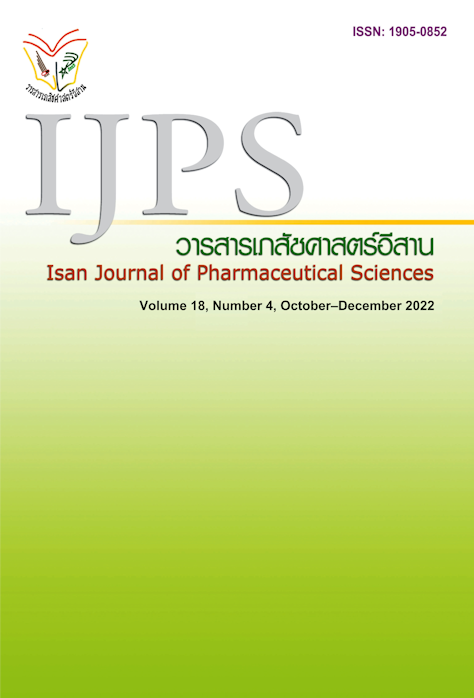Pharmacist role in providing care for patients with septicemia in Lampang hospital
Main Article Content
Abstract
Septicemia is commonly present among hospitalized patients and it increases the mortality. Pharmacists should provide pharmaceutical care and ensure that patients with septicemia receive the correct and appropriate antibiotics. Objective: The present study examined the effect of pharmacist providing pharmaceutical care for patients hospitalized with septicemia. Factors associated with the pharmacist’s interventions on antibiotic prescribing and with the drug and dosage adjustment following the interventions were determined. Methods: Prospective analytical study design was used. Data collection was conducted between October 2019 and April 2021. Study patients were divided into three groups 1) the group that pharmacist interventions were accepted by attending physicians leading to antibiotic adjustment 2) the group that did not receive pharmacist interventions and 3) the group that pharmacist interventions were not accepted by physicians. Multivariate logistic regression analysis was used to determine factors associated with pharmacist interventions and physician acceptance of pharmacist interventions. Results: Out of 322 patients with septicemia prescribed antibiotics, 127 (39.4%) were given the interventions and 109 (85.8%) had the antibiotic adjustment. Patients who had immunosuppressants prior to the antibiotic prescribing and those who got first prescribed commonly used antibiotics had a lower chance of the interventions (odds ratio (OR), 0.31; 95% CI, 0.11-0.87 and 0.44; 0.25-0.79, respectively). On the contrary, patients with chronic kidney diseases were more likely to receive the interventions (OR, 2.39; 95% CI, 1.31, 4.33). Patients with HIV/AIDS had a lower chance of the physician acceptance of pharmacist interventions (OR, 0.11; 95%CI, 0.02-0.64), whereas those having sepsis acquired from communities and those receiving sympathomimetic agents if necessary had a higher chance of the intervention acceptance (OR, 3.38; 95%CI, 1.02-11.22 and 4.24; 1.29-13.88, respectively). Conclusion: This study revealed the importance of involving pharmacist in healthcare team for patients with septicemia, especially for antibiotic prescribing and effects on physician acceptance.
Article Details

This work is licensed under a Creative Commons Attribution-NonCommercial-NoDerivatives 4.0 International License.
In the case that some parts are used by others The author must Confirm that obtaining permission to use some of the original authors. And must attach evidence That the permission has been included
References
Cairns KA, Jenney AW, Abbott IJ, Skinner MJ, Doyle JS, Dooley M, et al. Prescribing trends before and after implementation of an antimicrobial stewardship program. Med J Aust. 2013;198(5):262-266.
Cavanaugh JB Jr, Sullivan JB, East N, Nodzon JN. Importance of pharmacy involvement in the treatment of sepsis. Hosp Pharm. 2017;52(3):191-197.
Durand A, Gillibert A, Membre S, Mondet L, Lenglet A, Mary A. Acceptance Factors for In-Hospital Pharmacist Interventions in Daily Practice: A Retrospective Study. Front Pharmacol. 2022;13:811289.
Evans L, Rhodes A, Alhazzani W, Antonelli M, Coopersmith CM, French C, et al. Surviving sepsis campaign: international guidelines for management of sepsis and septic shock 2021. Intensive Care Med. 2021;47(11):1181-1247.
Falcão F, Viegas E, Lopes C, Branco R, Parrinha A, Lobo Alves M, et al. Hospital pharmacist interventions in a central hospital. Eur J Hosp Pharm. 2015;22:94–97.
Hashimoto M, Asai S, Umezawa K, Kohara K, Miyazawa M, Suzuki Y, et al. Impact of ward pharmacist-led antimicrobial stewardship in intensive care units. J Chemother. 2022:1-10.
Lakbar I, De Waele JJ, Tabah A, Einav S, Martin-Loeches I, Leone M. Antimicrobial de-escalation in the ICU: from recommendations to level of evidence. Adv Ther. 2020;37(7):3083-3096.
Mas-Morey P, Ballesteros-Fernández A, Sanmartin-Mestre E, Valle M. Impact of clinical pharmacist intervention on antimicrobial use in a small 164-bed hospital. Eur J Hosp Pharm. 2018;25(e1):e46-e51.
Masterton RG. Antibiotic de-escalation. Crit Care Clin. 2011;27(1):149-162.
Ministry of Public Health. Health Key Performance Indicators: Mortality rate in patients with community acquired sepsis [Online]. 2022. [cited 2022 June 9]. Available from: http://healthkpi.moph.go.th/kpi2/kpi-list/view/?id=1448
Monmaturapoj T, Scott J, Smith P, Abutheraa N, Watson MC. Pharmacist-led education-based antimicrobial stewardship interventions and their effect on antimicrobial use in hospital inpatients: a systematic review and narrative synthesis. J Hosp Infect. 2021;115:93-116.
National Antimicrobial Resistant Surveillance Center, Ministry of Public Health. Situation of antimicrobial resistant in Thailand [Online]. 2013. [cited 2022 June 9]. Available from: http://narst.dmsc.moph.go.th/news001.html.
Paul M, Shani V, Muchtar E, Kariv G, Robenshtok E, Leibovici L. Systematic review and meta-analysis of the efficacy of appropriate empiric antibiotic therapy for sepsis. Antimicrob Agents Chemother. 2010;54(11):4851-4863.
Phumart P, Phodha T, Thamlikitkul V, Riewpaiboon A, Prakongsai P, Limwattanon S. Health and economic impacts of antimicrobial resistant infections in Thailand: A Preliminary Study. JHSR. 2012; 6:352-360.
Rhodes A, Evans LE, Alhazzani W, Levy MM, Antonelli M, Ferrer R, et al. Surviving Sepsis Campaign: International Guidelines for Management of Sepsis and Septic Shock: 2016. Intensive Care Med. 2017;43(3):304-377.
Schramm GE, Kashyap R, Mullon JJ, Gajic O, Afessa B. Septic shock: a multidisciplinary response team and weekly feedback to clinicians improve the process of care and mortality. Crit Care Med. 2011;39(2):252-258.
Seymour CW, Liu VX, Iwashyna TJ, Brunkhorst FM, Rea TD, Scherag A, Rubenfeld G, Kahn JM, Shankar-Hari M, Singer M, Deutschman CS, Escobar GJ, Angus DC. Assessment of Clinical Criteria for Sepsis: For the Third International Consensus Definitions for Sepsis and Septic Shock (Sepsis-3). JAMA. 2016;315(8):762-774.
Song JU, Sin CK, Park HK, Shim SR, Lee J. Performance of the quick sequential (sepsis-elated) Organ Failure Assessment score as a prognostic tool in infected patients outside the intensive care unit: a systematic review and meta-analysis. Crit Care. 2018;22:28.
The Sanford Guide to Antimicrobial Therapy. Dallas, Texas: Antimicrobial Therapy, Inc., 2020.
The Thai Society of Critical Care Medicine. Clinical practice guideline for management severe sepsis and septic shock [Online]. 2015. [cited 2019 July 3]. Available from: http://www.ayhosp.go.th/ayh/images/HA/miniconf/5.pdf
Zilberberg MD, Shorr AF, Micek ST, Mody SH, Kollef MH. Antimicrobial therapy escalation and hospital mortality among patients with health-care-associated pneumonia: a single-center experience. Chest. 2008;134(5):963-968.


